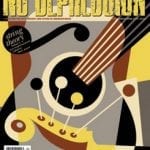Ken Nelson: 1911 to 2008
Kenneth Francis Nelson, who died January 6 at his home in Somis, California, at 96, was an enabler in the best sense of the word. In 26 years overseeing Capitol Records’ country division, his primary goal beyond selling records was allowing his acts the tools and means — combined with no-nonsense advice — to create their music their way. “My theory,” he explained to me in 1992, “always has been if you have to tell an artist what to do, if you have to show them how to sing, they’re not real artists.”
His demeanor at sessions was deceiving. Sitting at the control room console, he absentmindedly doodled on a notepad, yet heard every note sung or played. In 1992, Nelson’s biggest success, Buck Owens, explained, “He always was listening and always was workin’ and tryin’ to stay out of our way, but to be of assistance to us…the best damn producer Merle Haggard and I could ever have.”
Nelson’s difficult early life on Prohibition-era Chicago’s mean streets come through in his 2007 autobiography My First 90 Years Plus 3. Born in 1911 to unmarried parents in Caledonia, Minnesota, he spent part of his childhood in orphanages before learning the music business from the ground up. He strummed a tenor banjo in local orchestras and promoted songs for singer Gene Austin’s music publishing company. After co-founding pop vocal trio the Campus Kids with boyhood friend Lee Gillette, Nelson left to sing on other stations before turning to announcing. His first experience with country came playing records at Chicago’s WAAF before he joined the larger WJJD.
In 1947, when Gillette was producing country hits for Capitol in Hollywood, he and Capitol sideman/talent scout Cliffie Stone joined Nelson, who had music publishing experience, to form the company later known as Central Songs (in 1969, they sold it to Capitol for $1.7 million). Nelson headed west in 1948 to run Capitol’s transcription service, taking over country when Gillette switched to pop production in 1950.
He added new voices to an already rich roster that included Hank Thompson, Jimmy Wakely and Merle Travis, among them west coast acts Ferlin Husky, Tommy Collins and Jean Shepard. In Nashville, he signed Roy Acuff, the Jordanaires, the Louvin Brothers and Sonny James, plucking Faron Young from the Louisiana Hayride. Satirist Stan Freberg’s popular, often acerbic spoofs of current hit records were also Nelson productions, recorded with Hollywood’s greatest session musicians.
Recalling the Elvis tsunami of 1956, Nelson said, “I saw rock and roll was the coming thing, and at first Capitol refused to recognize that. But I went ahead and signed Gene Vincent, which proved [my view] was right.” He also signed Wanda Jackson, producing rockabilly classics on both.
With rock sending country into freefall, Nelson had ideas there as well. While Red Foley and Eddy Arnold recorded with background singers earlier, Nelson, well versed in using vocal ensembles, created a template for the Nashville Sound by adding the Jordanaires behind Sonny James on “Young Love” and on Ferlin Husky’s ballad “Gone”, omitting fiddle and steel. The crossover successes of both singles launched a trend. In 1957, Chet Atkins began producing Jim Reeves that way.
Nelson protected his acts. When a substance-abusing Travis recorded flawed take after flawed take for an instrumental guitar album, Nelson meticulously spliced together usable bits of various takes to create a releasable LP. He also had limits. Guitarist Jimmy Bryant’s volatile behavior got him dropped from Capitol’s roster.
He was also capable of miscalculating. Neither Jerry Reed nor Bobby Bare thrived at Capitol, and adding a pop vocal ensemble to Buck Owens’ first session in 1957 led to anemic sales that nearly cost Owens his contract. After fighting to keep him, Nelson defaulted to the honky-tonk that launched Buck’s career. Even so, when Owens experimented with rock-flavored country in the early ’70s, a disapproving Nelson left Owens to produce himself.
As Buck headed into overdrive with “Act Naturally” in 1963, Nelson first heard Merle Haggard. Loyal to his small Bakersfield label, Haggard refused to join Capitol until 1965. Over the next decade, Nelson brought out the brilliance that made him a second pillar of the Bakersfield Sound and an enduring American artist. Retiring from Capitol in 1976, Nelson briefly produced Haggard independently. He remained in touch with industry friends, but focused mainly on travel and his family.
It remains troubling that Nelson’s election to the Country Music Hall of Fame took decades. Some of Capitol’s west coast acts, Owens and Haggard among them, openly scorned Music Row. Nelson, by contrast, was an insider, a founding member of the CMA and its President in 1961 and ’62. Fortunately he remained healthy enough to attend his 2001 induction at age 90. Illness only intervened in recent years. “Fate,” he told me, “just puts everything together.” Owens, summing up his mentor in 1992, felt his impact transcended mere music. “He was a very silent influence on me, as far as growing and being a good citizen.Ken Nelson was a very great man.”




